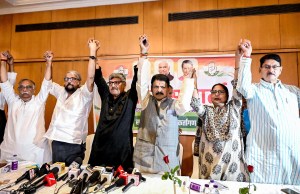Long Goodbye
The surprising nostalgia for an ancient means of communication
The surprising nostalgia for an ancient means of communication
On july 15 at the Kashmere Gate telegraph office in New Delhi,Lata Harita sat at her desk clearing away the traffic,which had dropped to 40-50 telegrams a day two months ago. The announcement of its demise had revived the telegrams fortunes; the telegraph office was averaging nearly 200 telegrams a day. Earlier it was the needy,but now a lot of youngsters come, she said.
Obituaries to technologies are written almost every week only last week we bid goodbye to Google reader but none has seen such a fond and protracted farewell as the telegram. The Google generation had heard telegram tales from mothers and grandfathers. When my grandfather told me of his cherished telegrams in 1977 from the Indian Government on his appointment to the civil service; asking him to return from Budapest; a flood of them in 1985,for my mothers wedding; the green telegram of death from Nagpur,when his brother had died I too wanted my share of telegram stories.
In 1984,when Delhi was ravaged by the riots,Harita said they stuck photos of terrorists on their walls,to identify them in case they dropped by to send a telegram. And when Sonia Gandhi refused the prime minister-ship,we received thousands of telegrams,begging her not to do this, she said. Kargil,Commonwealth Games,Rajiv Gandhis death,the 2011 Congress plenary these were the events that gave people reasons to write telegrams. This generation also wants to live through a historic event,thats why theyre here, says Harita.
In 1981,Harita,a fresh graduate,had begun her training as a telegraphist from the Kashmere Gate building. I started work at the Pragati Maidan camp office during the ASIAD games. It was an exciting time. A year later,when she was married,Harita refused to work on the teleprinter machine for a month,complaining that the gumming board attached to it would ruin her trousseau of new silk sarees.
While most telegraphists literally ran at the sight of an approaching reporter,Harita enjoyed decoding press copies. She made light of even 700-word copies,quickly deciphering the Morse codes. The codes were dots and dashes to you,but when they were transmitted through electric wires,we decoded them using sound. Gur-gur-gut-gut-gur-gur the machine would wail as Harita hurried to scribble down the words.
Babulal from Turkman Gate had also come to send his last telegrams. You know I trained to be a telegraphist at PTT Saharanpur in 1965. But I was suspended because I played too many pranks and made too many mistakes, he said conspiratorially. To his three grandchildren he wrote,Wealthy,all is well. Nothing to tell. Signed dada.



- 01
- 02
- 03
- 04
- 05




























